“Beating England in their own backyard was a fairytale” – Jamie Farndale on winning in London twice, missing out on Rio and the hectic schedule of a rugby sevens player
Jubilation at triumphing over the Auld Enemy is an unusually familiar feeling for Scottish rugby players at the moment.
The under 20 side triumphed 24-17 on Friday night before the full team’s scintillating display on Saturday evening in a weekend that really did see ‘them’ sent homewards tae think again.
One man who knows exactly what it is like to triumph over England is Scotland Sevens international Jamie Farndale.
As ‘sevens’, as the game is commonly known, enters a big year – with both the World Cup in San Francisco and the Commonwealth Games on the Gold Coast, I caught up with Farndale to find out just what it’s like to play this most intense of sports.
Farndale was part of the Scotland side that achieved remarkable things at last year’s final event of the season at Twickenham in May.
In the semi-final they secured the country’s first win over New Zealand at any age level or in any version of the sport, as Farndale himself scored the winning try with the clock in the red to complete an amazing comeback from 21-0 down.
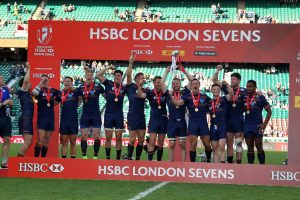
Not content with this, they backed it up with victory over the hosts in the final to secure only their second ever title on the circuit.
“I remember thinking wow we’ve got to a semi final,” Farndale says, recalling his fondest day in the sport. “To hit the final and then to win it in such a dramatic fashion was huge so that was a pretty special day.
“That second day was just unbelievable. We had Scott [Wight] and Mark [Robertson] retiring so it was their last bash at it and to beat New Zealand first of all was huge, to then beat the USA and then to beat England in their own back yard at Twickenham was just a perfect day. It couldn’t have gone any better.”
Despite Scotland’s relative lack of professional success, sevens originated in the small Scottish Borders town of Melrose as far back as 1883.
The game is engrained in the culture of Scottish rugby, and Melrose’s own tournament continues to this day with teams invited from all around the world.
Farndale, like most young Scottish rugby players, began playing at school – in the so-called Scottish ‘summer’ months – and continued to play when he turned professional.
“When I signed my first professional contact there was a youth Commonwealth Games for under 18s on the Isle of Man in 2011,” he says. “I went as captain of a sevens team so it’s quite funny that obviously the Commonwealth Games is coming up now and I’m back in the sevens.”
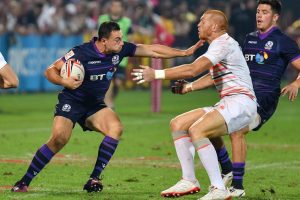
His progress from youth prospect to full international has not been plain sailing however. In Farndale’s first full season, Scotland had just lost the right to host their own tournament on the World Series circuit – putting the future of the team in jeopardy.
“When I first came into the squad it was a squad of 20 people and it was a full-time sevens programme,” he says.
“That was facilitated by having their own tournament that gave them revenue so it was justified. I suppose when they lost that tournament everything that is put into sevens becomes an expense.”
Fortunately for Farndale – and for Scottish rugby fans in general – the programme was kept, and they have since enjoyed their two most successful series in history – winning the London leg in both 2016 and 2017.
The other positive of the change from a full-time programme was the emphasis on using the team as a ‘development pathway’ for young Scottish talent unable to force itself into the two professional franchises.
“This is where the outlook of the programme has changed,” Farndale tells me. “It’s now a great development pathway for players. My first year contracted was when they said right we’re just going to have seven core players and it’s just going to be a development programme.”
Since 2010, 24 full Scottish capped players first cut their teeth with the sevens side, including 13 players in the current Six Nations squad and six that played in the famous victory over England on Saturday – Greig Laidlaw, David Denton, Stuart McInally, Hamish Watson, Pete Horne and new cap Blair Kinghorn.
Whether officially or not, the Scottish sevens side has always been an excellent pathway for young, talented players looking to force their way into club sides and beyond.
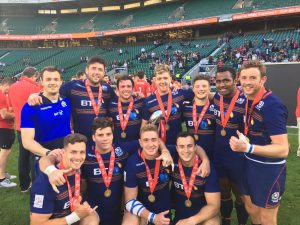
Talented youngsters Darcy Graham and George Horne look destined to make their international bows at some point this year after both starring on the sevens circuit and Farndale admits that he does have one eye on a career in the 15-a-side version of the game at some stage.
“Definitely there are things I would like to achieve in 15s,” he says. “I suppose I just need to keep playing as well as I can and if opportunities come and they look like good opportunities then that is definitely something I would take.
“At the same time it’s such a great lifestyle that I’ve got at the moment, I’m happy so it would have to be a pretty big opportunity to walk away from what I’ve got ‘cause I’m enjoying playing my rugby and enjoying my lifestyle.”
The lifestyle does sound pretty good on paper. Dubai and Cape Town before Christmas; trips to Sydney and Hamilton in January and February and this weekend he jets off for the bright lights of Las Vegas.
But don’t be fooled, these are not holiday destinations. Rather two-day festivals of one of the fastest, hardest and most physically demanding sports on the planet.
“It is knackering,” Farndale says, with an exasperated wisdom beyond contradiction. And with three years on the circuit he knows full well the unforgiving nature of these tournaments.
“You definitely get into some dark places,” he says. “We’ve got our systems and our game plan and we just drill them again and again and again so that when you’re in the really dark place it’s almost second nature.
“What helps when you’re absolutely knackered is that you know where you need to be and the person beside you knows where they need to be, it has to be second nature.
“In sevens there is so much space and so many decisions made in a split second it almost comes down to instinct and knowing your inside guy and your outside guy.”
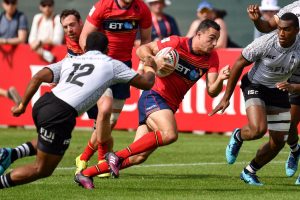
Instinct is something Farndale references a lot, and it is at the core of what the sport is all about. Some of the most wonderful pieces of skill ever performed on rugby pitches have come from the shorter version of the game and it is this instinct that sets world class sevens players apart from their 15-a-side counterparts.
“You can see when 15s players come across it is difficult for them to immediately fit straight in,” he says. “No matter how high quality the player is everyone needs a bit of time just to get used to the systems.
“If you look before the Olympics there were a lot of superstars that came into a whole load of different teams. Quade Cooper came in, [Bryan] Habana came and you had the Honey Badger [Nick Cummins] playing.
“A lot of them didn’t end up going to the Olympics which sort of backs that up that you get these players who are absolutely quality, but a lot of sevens does come down to experience and the way that you know your team.”
Despite the obvious physical demand, Farndale is adamant that the mental side of the game is the harder part to master.
“It can be really easy to get caught up in the result,” he explains. “But actually the biggest thing for me is your routine in between games – it should look exactly the same every time.
“Obviously if you come off and you’ve just had a really close loss or that maybe you’ve been personally responsible for the loss you can be absolutely gutted but the biggest and, I suppose, most professional part of it is just coming off and reacting the exact same way.
“It’s harder after the big wins in a way, like in Twickenham last year, obviously beating the All Blacks we knew that no Scottish team had ever beaten an All Blacks team before, and it was just so massive.
“It was massive but we came off and we knew we still had a job to do and we managed to beat the USA and beat England and win the cup – but it was almost harder after that win to come off and react the same way.”
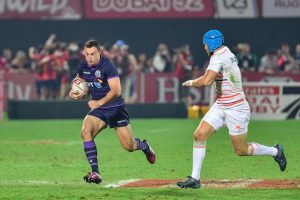
This extreme professionalism epitomises the shorter, faster form of the game. Not only are the halves seven rather than 40 minutes, and the players on the field reduced from 15 to just seven, but the amount of time to digest eye-watering highs and gut-wrenching lows are fractions of what they are in the larger format of the game.
England will have had two weeks to regroup after their Six Nations loss this weekend and formulate a strategy to take on France. Farndale and his teammates regularly only have hours to heal, adapt and get back in the right frame of mind to do battle once more.
“Quite often it hits you afterwards,’ he says. “I mean the biggest wins don’t really hit you until at least a couple of days after – if not weeks after.
“There are these massive things that you will remember for the rest of your life that you have just parked ‘cause you’re focusing on the next game. It does take a bit of mental strength but it is made easier by a team buy in to that.
“It’s so easy after you’ve had a big loss to come in and kick tables over and look really pissed off and not speak to anyone and it’s really easy to come in after a big win and jump around and celebrate.
“If it’s a big win we’ll jump around on the pitch and whatever – emotions are obviously why you play the game, you need to enjoy the wins – but as soon as we get back in the changing room if we can switch on to the next job it helps the younger guys to do so as well.”
At still only 24, Farndale’s incredible professionalism disguises his youth, and it hasn’t all been plain sailing for the young man.
Just weeks after winning his first title with his country he was invited to train in London with a prospective Team GB squad for rugby sevens’ inaugural Olympic appearance at the 2016 Games in Rio.
“My first season that I came into the Scotland team I was contracted as one of the core players but I’d only played one tournament before that so I thought I was just going to work hard and see what I could do,” he says.
“I ended up being the players’ player of the year and top try scorer and we won the London sevens that year. It was the first time we’d ever done it so I went down there [to the training camp in London] full of confidence, thinking that I had a really good shot of going.”
As with all good sporting stories, disaster struck, and Farndale’s meteoric rise was curtailed by injury.
“I played in the first selection tournament in Moscow, a week after we won the London sevens, and tore a tendon in my hamstring,” he says.
“It was only a month before the selection for Rio and I missed three weeks of that. They said when I did it that it was going to be eight weeks which would take me until after the Olympics completely.
“They said judging by that it is probably best that you go home and link up with your physio back home but this was potentially a once in a lifetime chance.
“I asked if I could just stay down and try and rehab it and see how far I could get and I managed to get back in three weeks with a lot of determination and I played in the last selection tournament and put my hand up for selection.”
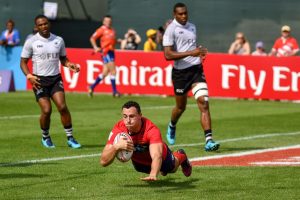
Despite this incredible display of resilience and determination in the face of nearly insurmountable odds, Team GB selectors chose to leave Farndale at home as they began the journey that took them to Olympic silver.
“I suppose it was weird,” he reflects. “It was ups and downs. I genuinely thought I had a good chance of going and then to sort of say goodbye to that when I was told it would be eight weeks, and then to have that hope grow and grow.
“I felt like I played pretty well in that last tournament and I suppose I was just happy that I had put myself in a place where I genuinely had to be considered from having given up on it completely.”
But Farndale, as you would suspect, is not one for wallowing on past disappointments. His incredibly professional attitude shines through ahead of this hugely important year for the sport.
“In the short term, the Commonwealth Games is a massive thing to focus on for me,” he says. The next tournament in Las Vegas we need to do as well as we can as a team and then after that we’ll learn some lessons.
“The more we come together as a team and the more we start winning the more that is going to continue and the long term goals will take care of themselves.”
Casting the eye further than this year, Farndale does admit that past disappointments fuel his future plans.
“Missing out on Rio was definitely one of the hardest things I’ve gone through in my career,” he says. “It just put such a fire into me to be available for Tokyo so that is definitely something I’ve got in my mind going forward – that is something I want to achieve in my career.”
As professional an athlete as I’ve come across, I get the feeling that anything Farndale sets his mind to achieving – be it in sevens or in the traditional format of the game – he will.